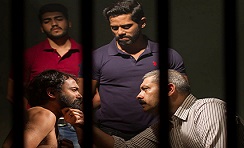|
|
||
|
Pro Tools
FILMFESTIVALS | 24/7 world wide coverageWelcome ! Enjoy the best of both worlds: Film & Festival News, exploring the best of the film festivals community. Launched in 1995, relentlessly connecting films to festivals, documenting and promoting festivals worldwide. Sorry for the disruptions we are working on the platform as of today. For collaboration, editorial contributions, or publicity, please send us an email here. User loginActive Members |
Siraj SyedSiraj Syed is the India Correspondent for FilmFestivals.com and a member of FIPRESCI, the International Federation of Film Critics. He is a Film Festival Correspondent since 1976, Film-critic since 1969 and a Feature-writer since 1970. He is also an acting and dialogue coach. @SirajHSyed  Chase--No Mercy to Crime, Review: Robbing trains for electoral gains
Chase--No Mercy to Crime, Review: Robbing trains for electoral gains A taut crime thriller in the making, Chase: No Mercy to Crime proceeds at a languorous pace that is quickened only by some rapid cuts and jerky pans. It is based on true events that spanned two Indian states, and the criminals-police chase crossed into Nepal and Thailand too. But, unless the thrills are present and confined to the first few scenes, which I missed due to awful road traffic, the film ends up being a routine crime drama, with only hints of action and detection. Chase: No Mercy to Crime revolves around a train robbery master-minded by Jharkhand- based outlaw father-son duo, Shailendra and Satyendra Yadav, who wield immense clout among the law-makers and law-enforcers in their state. In the neighbouring state of West Bengal, police get intelligence that the Rs. 100 crore robbed from the train belonged to a bank, and was to be used to fund a political party’s election campaign. Following the trail, they get into the act, and nab a high-profile trader, for financial irregularities. In exchange for leniency before the courts, the police team of Avinash (Senior Police Officer), Imran (his second in command) and Deepti (another member), and a fellow recruit, ask him to negotiate a land-deal with the Yadavs. Having their eye on the plot, the Yadavs have already killed the son of the owner, Shastri, who refused to vacate his land, and they now threaten Shastri with the murder of his daughter, unless he signs the papers. Unable to stand against the terrorisers any more, Shastri relent, and gives the land to the Yadavs. Pretending to be buyers, the police team lays a tap and asks the Yadav’s to come to Nepal, where they claim their office is located, to finalise the deal and hand over the money, a price of Rs. 15 crore (Rs. 150 million). Nepal shares a porous border with India, and it would be easier to arrest the influential Yadavs away from their benefactors and godfathers in a foreign country, with the collaboration of Nepalese police. A Yada henchman, Anwar, a key player in the train robbery, also happens to be in hiding in Nepal, so they feel quite safe in making the journey. Avinash seeks the consent of a West Bengal Minister to undertake an operation to apprehend the Yadavs and Anwar in Nepal. Initially, the minister expresses doubt that a Muslim, Imran, should be a part of the team, on such a mission (some Muslims have been known to undertake terrorist acts, causing mistrust among some other fellow Indians about Muslim police officers’ bona fide intentions in crime control). Avinash not only gives Imran a clean chit, but goes one step further, in extolling his virtues, and insisting on him being part of the core group. It’s a cleverly constructed ensemble: On the side of the law are a Minister, a senior police officer, a junior police officer, a dedicated woman officer, another male lieutenant and a Thai policeman, who is a Sikh, obviously of Indian origin. The arch-villains are a father and son duo, who will do anything for money, a Muslim on their payroll, and a trader as a front-man. However, nothing exciting really happens between them, except routine conversations, elaborately detailed threats, phone calls, meetings, travel, getting in and out of cars, checking into hotels, and so on. Some other characters are really inconsequential, and, instead of introducing them, the writer-director should have concentrated on developing the personnel he had. These include Imran’s wife, daughter, the Sardarjee policeman in Thailand and Mahendra Yadav, Shailendra’s estranged brother, who lives in Bangkok. Mahendra’s character was needed, but it comes across as half-baked, neither here nor there. Director Suvendu Raj Ghosh (name of writer/writers not available), who has four Bengali films under his belt, comes across as a debutant in his first Hindi-English bi-lingual venture (a lot of the dialogue between the police officers, and of Avinash with the minister, is in English). On the other hand, it could be a case of a very weak screenplay, possibly too close to the reality of the case, that he was saddled with. Usually, real-life police cases are not half as exciting or thrilling as those seen on the screen. That is so because the fictionalised versions either fill in the blanks of the tale with power-punches, or, going one step further, embellish the narrative with plausible, yet compelling, ‘could have been’ elements. That is clearly not the case here. Dipanjjan Basak as Imran has a good combination of a vulnerable face and a gym-dream body, which is shown in all its sinews while he is taking a shower. Sadly, besides throwing a few punches, pulling out guns, lolling in bed with his wife and fondling his darling daughter, there is little to challenge his acting skills. Ditto his partner, the actress playing Deepti, who comes across as slick, suave and savvy, which is fine for an undercover cop, but nothing to write home about. Amyth Sethi has the looks of a brat and seems to enjoy his villainy as Sattu, while the artiste playing his father digs even deeper into the devil incarnate act, relishing every moment his vile deeds. In the role of the Sikh cop, the actor just stops short of turning into caricature. In a piece of perfect casting, Sudip Mukherjee convinces as the senior police officer, within the limitations of the script. Why does he have to have inane conversations on the phone, and insist on speaking English most of the time, though he proves that he is equally conversant with Hindi and Urdu, and shoot out the petty commands all through, only a few people would know. And amazingly, he goes on international travel without any belongings whatsoever, not even a hand- carry bag. Talk about travelling light! Mushtaque Khan makes an acceptable Minister, but he too is made to talk standing, like most of the characters in the film, and the scene wherein he offers a glass of water to Avinash, and drinks it himself when Avinash declines, is watery, to best describe it. Old-timer Ramesh Goyal plays Mahendra, and though he does it with flair, he does look out of place in his Bermudas and his glib talk, which is not backed by any substance. Other names in the cast are Gulshan Pandey as Paban, Gargi Patel as Sattu's Mother, Sameeksha Gaur as Guddi and Soham Bose as the fourth member of the police task-force. Actors playing Deepti, the Sikh policeman and Anwar remain unidentified. Songs, by Bob S.N., Rohan D. Pathak and Pinaki Bose, serve the purpose, and include an item number in a local dialect that has dancers lip-syncing when there are no words audible on the track. Veteran Kumar Sanu is among the singers, and that is welcome. The other two voices belong to Trissha and Buddha. Lyrics are penned by Sudhakar Sharma and Rohan D. Pathak. Till the middle of the film, the background music score blasts the eardrums, has a life of its own, independent of the visuals, and is obviously out to showcase the genius of Bob S.N. Cinematography by Arabinda Narayan Dolai could have been much more of a visual treat than it is, what with locales like Bangkok, Pattaya and Nepal. Instead, it is confined a few aerial shots of the tourist havens and a dimly-lit piece from the dance performance at Pattaya’s internationally famous Alcazar ‘lady-boy’ cabaret show, which has no relevance to the story. Raj Singh Sindhu tries to create some drama through editing ploys, but only manages to help sustain borderline interest in the goings-on. There is no rating, since I missed a sizeable part of the beginning, but what I saw failed to make the mark. We have seen so many better constructed and more competently executed, taut crime thrillers. Some of them have been really ‘merciless’, while Chase: No Mercy to Crime, by comparison, is tame, and shows a lot of mercy. Trailer: https://in.bookmyshow.com/videos/movie-trailers/now-showing/chase-no-mercy-to-crime/ET00101106 03.08.2019 | Siraj Syed's blog Cat. : Amyth Sethi Arabinda Narayan Dolai Bob S.N. Buddha Dipanjjan Basak Gargi Patel Gulshan Pandey Kumar Sanu Mushtaque Khan Pandey Pinaki Bose Raj Singh Sindhu Ramesh Goyal Rohan D. Pathak Sameeksha Gaur Soham Bose Sudhakar Sharma Sudip Mukherjee Suvendu Raj Ghosh Trissha Independent FILM
|
LinksThe Bulletin Board > The Bulletin Board Blog Following News Interview with EFM (Berlin) Director
Interview with IFTA Chairman (AFM)
Interview with Cannes Marche du Film Director
Filmfestivals.com dailies live coverage from > Live from India
Useful links for the indies: > Big files transfer
+ SUBSCRIBE to the weekly Newsletter DealsUser imagesAbout Siraj Syed Syed Siraj Syed Siraj (Siraj Associates) Siraj Syed is a film-critic since 1970 and a Former President of the Freelance Film Journalists' Combine of India.He is the India Correspondent of FilmFestivals.com and a member of FIPRESCI, the international Federation of Film Critics, Munich, GermanySiraj Syed has contributed over 1,015 articles on cinema, international film festivals, conventions, exhibitions, etc., most recently, at IFFI (Goa), MIFF (Mumbai), MFF/MAMI (Mumbai) and CommunicAsia (Singapore). He often edits film festival daily bulletins.He is also an actor and a dubbing artiste. Further, he has been teaching media, acting and dubbing at over 30 institutes in India and Singapore, since 1984.View my profile Send me a message The Editor |













